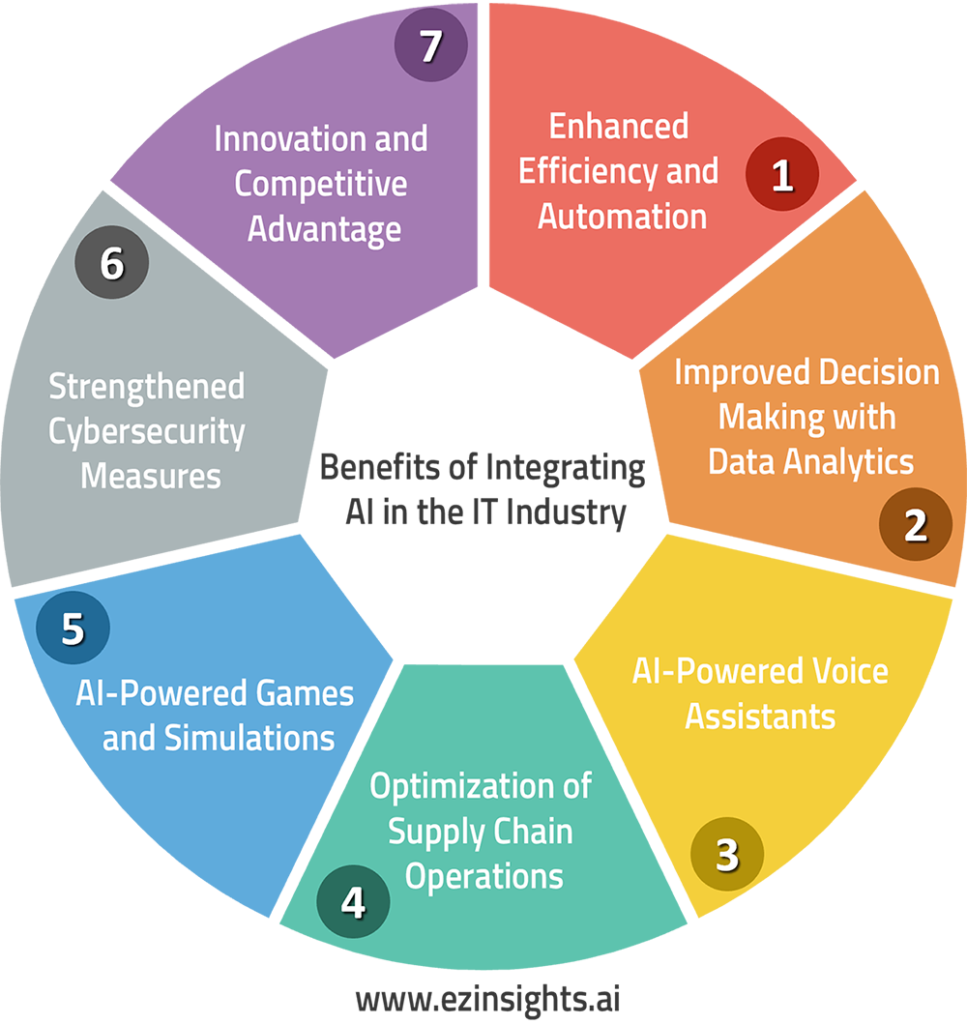Artificial intelligence (AI) is transforming processes, increasing efficiency, and spurring innovation in a few different fields. A Gartner analysis states that the number of enterprises utilizing AI services increased by 270% between 2015 and 2019. A study conducted by the MIT Sloan School of Management found that approximately 87% of businesses believe AI may give them a significant competitive advantage. For the next ten years, the global AI market is projected to increase at a 13x rate.
AI Technologies for IT
AI technologies, including machine learning and natural language processing, are revolutionizing the IT industry. These tools enhance operational efficiency through predictive analytics and automation. Machine learning algorithms optimize performance and reduce errors, while NLP-powered chatbots improve IT support and customer service, providing 24/7 assistance and boosting user satisfaction.
Robotic Process Automation (RPA) automates repetitive IT tasks, freeing professionals to focus on strategic initiatives. AI-driven cybersecurity solutions detect and respond to threats in real time, ensuring robust data protection. Overall, AI fosters innovation, efficiency, and security in IT operations, making it an essential component of modern IT infrastructure.
Benefits of Integrating AI in the IT Industry
Artificial Intelligence (AI) has a significant impact on the field of Information Technology (IT), providing a multitude of advantages that help businesses become more productive and competitive. This article examines seven major benefits of incorporating AI into the IT sector, emphasizing how it powers innovations like supply chains, AI-powered games, and voice assistants. Those benefits are as follows –

Enhanced Efficiency and Automation
The ability of AI to automate tedious jobs and optimize workflows is one of the technology industry’s main benefits. More quickly and precisely than human analysts, artificial intelligence (AI) systems can evaluate enormous volumes of data in real-time and spot patterns and abnormalities. AI-powered solutions can monitor networks, identify problems proactively, and even address common issues on their own, making this feature especially useful in IT operations management. Organizations can decrease manual intervention and increase operational efficiency and strategic resource allocation.
Improved Decision Making with Data Analytics
Advanced data analytics made possible by AI integration improves decision-making processes. AI systems can analyse large, complicated datasets at very fast speeds. From there, they may derive insights that can be used to forecast market dynamics, customer behaviour, and trends. This capacity is crucial for IT companies to allocate resources optimally, anticipate maintenance requirements, and spot chances for innovation. Organizations may make data-driven decisions that propel growth and competitive advantage in today’s changing business landscape by utilizing AI-driven analytics.
AI-Powered Voice Assistants Transforming User Experience
Voice assistants with AI capabilities mark a dramatic improvement in user interface design. These helpers are transforming customer service, increasing accessibility, and boosting user experience across the board in the IT sector. Artificial intelligence (AI) voice assistants can comprehend and reply to user requests, carry out activities, and even predict user demands based on previous encounters thanks to natural language processing (NLP) and machine learning. This technology allows hands-free access to information and services, which increases employee productivity while also streamlining IT processes.
Optimization of Supply Chain Operations
The application of AI to supply chain management has transformed demand forecasting, inventory control, and logistics. Artificial intelligence (AI)-driven systems examine past data, current market conditions, and outside variables to precisely forecast demand and maximize inventory levels. Additionally, by detecting inefficiencies, automating the procurement process, and reducing risks like delays and interruptions, AI improves supply chain efficiency. Organizations can realize cost savings, expedited delivery times, and enhanced customer satisfaction by utilizing artificial intelligence (AI) in information technology to facilitate seamless supply chain processes.
Advancements in AI-Powered Games and Simulations
AI has been embraced by the gaming industry to provide dynamic gameplay, realistic simulations, and immersive experiences. With the aid of AI algorithms, game creators may produce non-player characters (NPCs) who possess sophisticated behaviours, change their difficulty depending on the interactions of the player, and offer customized gaming experiences. Beyond simple entertainment, AI-powered games demonstrate how creatively the IT sector has used machine learning to improve graphics rendering, forecast player behaviour through predictive analytics, and create dynamic virtual worlds. These developments not only push the limits of gaming but also show how AI has the power to revolutionize interactive digital experiences in a wide range of applications.
Strengthened Cybersecurity Measures
AI is essential for supporting IT security protocols at a time of growing cyberthreats. Through network traffic monitoring, anomaly detection, and proactive defence mechanism implementation, AI algorithms can discover and react in real-time to possible security breaches. By using historical data, machine learning models may anticipate and avert potential threats, improving an organization’s overall cybersecurity posture. Organizations may strengthen their defences against changing cyberthreats and protect critical data and systems from malevolent attacks by incorporating AI into information technology.
Innovation and Competitive Advantage
In the end, incorporating AI into the IT sector gives businesses a competitive advantage and promotes an innovative culture. Rapid prototyping, iterative upgrades, and agile development processes are made possible by AI-powered solutions, which shorten the time it takes for new goods and services to reach the market. IT companies may efficiently satisfy changing client needs, generate continuous innovation, and quickly adjust to market changes by utilizing AI’s skills in data analysis, automation, and predictive modelling. This agility positions companies as pioneers in utilizing cutting-edge technology to propel corporate success in addition to strengthening their market presence.
Challenges of Integrating AI in the IT Industry
Although artificial intelligence (AI) has a lot to offer the information technology (IT) sector, there are a few obstacles that businesses need to overcome to fully utilise the potential of AI –
- Data Quality and Integration
A major obstacle in the IT integration of AI is guaranteeing data quality and consistency across many systems and sources. For AI systems to produce precise insights and forecasts, data is a major requirement. Problems like biased, inconsistent, or inadequate data can cause mistakes and reduce AI’s efficacy. To guarantee that AI algorithms are provided with relevant and high-quality data to analyse, organizations need to invest in strong data governance frameworks, data cleaning procedures, and integration methods.
- Skill Shortage and Talent Acquisition
Specialized knowledge in data science, machine learning, and AI development is becoming more and more necessary due to the quick advancement of AI technology. Nonetheless, there is a dearth of experts in various sectors throughout the world. For IT companies, finding and keeping individuals with the skills to develop, implement, and manage AI systems is a major challenge. To effectively handle this challenge, it is imperative to engage in measures such as training current personnel and fostering talent pipelines through collaboration with academic institutions.
- Ethical and Regulatory Concerns
Applications of AI bring up moral questions like responsibility, bias, privacy, and openness. Concerns over data security and privacy, particularly when it comes to sensitive data handled by AI systems, make strict adherence to laws like the California Consumer Privacy Act (CCPA) and the General Data Protection Regulation (GDPR) necessary. Furthermore, fostering trust among users and stakeholders depends on reducing biases ingrained in AI algorithms and guaranteeing transparency in AI decision-making procedures.
- Integration with Existing IT Infrastructure
Technical difficulties arise when integrating AI technologies into the current IT infrastructure, particularly in large enterprises with intricate legacy systems. Concerns like scalability, compatibility, and interoperability may surface while using AI in diverse environments. To enable AI functionalities seamlessly, IT departments must carefully develop and implement integration strategies, which may call for upgrades to middleware, application interfaces, and infrastructure.
- Cost of Implementation and ROI
Significant upfront expenses, such as those for hardware, software licenses, data management systems, and trained staff, are associated with the implementation of AI technologies. The computation of return on investment (ROI) for artificial intelligence (AI) endeavours can present difficulties because of variables including volatile market situations, dynamic technological environments, and delayed realization of long-term advantages. To successfully allocate resources and justify AI investments, organizations need to create clear success indicators and perform extensive cost-benefit evaluations.
The role of AI in the IT industry
The role of AI in the IT industry is transformative, influencing various aspects of operations, security, decision-making, and innovation. Here’s a detailed overview of the role of AI in the IT industry:
Automation of Routine Tasks
AI automates repetitive and mundane tasks, such as data entry, software updates, and system monitoring, freeing up IT professionals to focus on more complex and strategic work.
Enhanced Cybersecurity
AI algorithms analyze vast amounts of data to detect anomalies and potential security threats in real time, enabling quicker responses to cyber-attacks and predicting future security breaches by analyzing patterns and trends.
Improved Decision-Making
AI-driven data analytics processes and analyzes large datasets to provide actionable insights, helping IT managers make informed decisions and forecast future trends based on historical data.
IT Support and Maintenance
AI-powered chatbots provide 24/7 IT support, handling common queries and troubleshooting issues, while predictive maintenance anticipates hardware or software failures, reducing downtime.
Resource Optimization
AI optimizes the use of IT resources by dynamically allocating them based on demand and usage patterns, reducing operational costs and ensuring efficient resource management.
Innovation and Development
AI streamlines the software development lifecycle by automating coding, testing, and deployment processes, accelerating development cycles and fostering innovation with new ideas and solutions.
Personalized User Experiences
AI enhances customer service by providing personalized support and recommendations based on user behaviour and preferences, tailoring IT services and solutions to individual needs for improved satisfaction and engagement.
Data Management
AI facilitates the integration and cleansing of data from various sources, ensuring high-quality and accurate data for better analysis and decision-making.
Strategic Planning
AI analyses market trends and competitive landscapes, providing valuable insights for strategic planning and decision-making, and simulating different scenarios to help organizations prepare for various possibilities.
Future trends of AI in the IT industry
Advanced Predictive Analytics
AI will continue to enhance predictive analytics, enabling IT systems to foresee and mitigate potential issues before they occur. This will lead to more proactive maintenance and improved system reliability, reducing downtime and increasing efficiency.
Autonomous IT Operations
The rise of self-managing IT systems, or AIOps (Artificial Intelligence for IT Operations), will automate complex decision-making processes. These systems will independently monitor, analyse, and respond to IT events, significantly reducing the need for human intervention and enhancing operational efficiency.
Enhanced Cybersecurity Measures
AI-driven cybersecurity will evolve to offer more sophisticated threat detection and response capabilities. Machine learning algorithms will be able to detect even the most subtle anomalies and adapt to new threats in real-time, providing stronger and more adaptive security frameworks.
AI-Driven Development Tools
The integration of AI into software development will streamline coding, testing, and deployment processes. AI tools will assist developers by suggesting code improvements, automating bug fixes, and optimizing code performance, leading to faster and more efficient development cycles.
Personalized IT Services
AI will enable highly personalized IT services tailored to individual user needs and preferences. By analysing user behaviour and preferences, AI can offer customized solutions and support, enhancing user satisfaction and engagement.
AI in Edge Computing
The convergence of AI and edge computing will allow for real-time data processing and analytics at the edge of networks. This will reduce latency, enhance data security, and enable faster decision-making for IoT devices and applications.
Ethical AI and Governance
As AI becomes more integrated into IT, there will be a greater focus on ethical AI and governance. Ensuring transparency, fairness, and accountability in AI algorithms will be critical to maintaining trust and preventing bias in AI-driven decisions.
Use cases and applications of AI in IT
Cybersecurity
AI enhances cybersecurity by detecting and responding to threats in real-time. Machine learning algorithms identify patterns and anomalies that indicate potential security breaches, automating threat detection and initiating appropriate countermeasures, providing robust protection against cyber attacks.
IT Support and Helpdesk
AI-powered chatbots and virtual assistants provide 24/7 IT support, handling routine queries and troubleshooting issues. They quickly resolve common problems, reducing the workload on human support staff and improving response times for users.
Predictive Maintenance
AI enables predictive maintenance by analysing data from IT equipment to predict when failures are likely to occur. This allows organizations to perform maintenance before issues arise, minimizing downtime and extending the lifespan of their hardware.
Data Management and Analytics
AI automates data management tasks such as data integration, cleansing, and transformation. Advanced analytics powered by AI uncover insights from large datasets, helping organizations make informed decisions and optimize their operations.
Software Development
AI assists in software development by automating code generation, testing, and debugging. AI tools suggest code improvements, identify bugs, and ensure optimal performance, accelerating development cycles and enhancing the quality of software products.
Real-world examples of AI in IT companies
Google Cloud AI
Google uses AI extensively in its cloud services to enhance data analytics, machine learning, and automation capabilities for businesses. For instance, Google Cloud’s AI and machine learning services allow companies to build and deploy machine learning models to analyse big data, improve customer experiences, and optimize operations.
IBM Watson
IBM’s Watson is a leading AI platform that helps organizations across various industries. In IT, Watson assists with predictive maintenance, cybersecurity, and data management. For example, IBM Watson AIOps uses AI to analyse IT operations data in real-time, predict issues before they occur, and provide actionable insights to prevent downtime.
Microsoft Azure AI
Microsoft Azure integrates AI capabilities to enhance its cloud services, providing tools for machine learning, cognitive services, and bot frameworks. Microsoft uses AI for network optimization, cybersecurity, and customer support through AI-driven virtual assistants. Azure’s AI-powered analytics help businesses derive meaningful insights from their data.
Amazon Web Services (AWS) AI
AWS offers a broad range of AI services, including Amazon SageMaker for machine learning, Amazon Rekognition for image and video analysis, and Amazon Lex for building conversational interfaces. AWS AI helps IT companies automate processes, enhance security, and develop intelligent applications. For example, Amazon’s AI services are used for real-time fraud detection and customer sentiment analysis.
Cisco AI Network Analytics
Cisco leverages AI for network management and optimization. Cisco’s AI Network Analytics uses machine learning to analyze network data, identify anomalies, predict potential issues, and optimize network performance. This helps IT administrators manage complex networks more efficiently and ensures better connectivity and security.
EzInsights AI
EzInsights AI is transforming data analysis and visualization in IT. The platform’s AI features enable users to load multiple data files (CSV, XLS, XLSX, XLSM, XLSB) and automatically generate interactive charts and reports. EzInsights’ natural language processing capabilities allow users to perform complex data queries using simple, natural language, making data analysis more accessible and efficient for businesses.
Conclusion
To sum up, the incorporation of artificial intelligence (AI) in the IT sector offers numerous advantages, such as improved productivity and automation, as well as revolutionary developments in user experience, supply chain management, and cybersecurity. In today’s digital market, firms that continue to use AI-powered solutions open new avenues for growth, innovation, and competitive distinction. IT companies can promote operational excellence, negotiate complexity, and set the way for a future where intelligent technologies define the forefront of technical innovation and corporate success by strategically utilizing AI’s capabilities.
FAQs
What are the specific advantages of AI in IT?
AI has many advantages, including increased cybersecurity with predictive analytics, increased operational efficiency through automation, better decision-making through data-driven insights, and cost savings through resource allocation optimization.
How does AI enhance cybersecurity in the IT sector?
By continuously scanning networks for anomalies, identifying and countering attacks in real-time, and using predictive analysis to foresee possible breaches or weaknesses before they happen, AI can strengthen cybersecurity.
What role does AI play in IT infrastructure management?
By anticipating system failures, allocating resources optimally, automating repetitive operations like patch management and software upgrades, and enhancing overall system performance and dependability, artificial intelligence (AI) enables proactive IT infrastructure management.

Anupama Desai
President & CEO
Anupama has more than 23 years of experience as business leader and as an advocate for improving the life of the business users. Anupama has been very active in bringing business perspective in the technology enabled world. Her passion is to leverage information and data insights for better business performance by empowering people within the organization. Currently, Anupama leads Winnovation to build world class Business Intelligence application platform and her aim is to provide data insights to each and every person within an organization at lowest possible cost.

